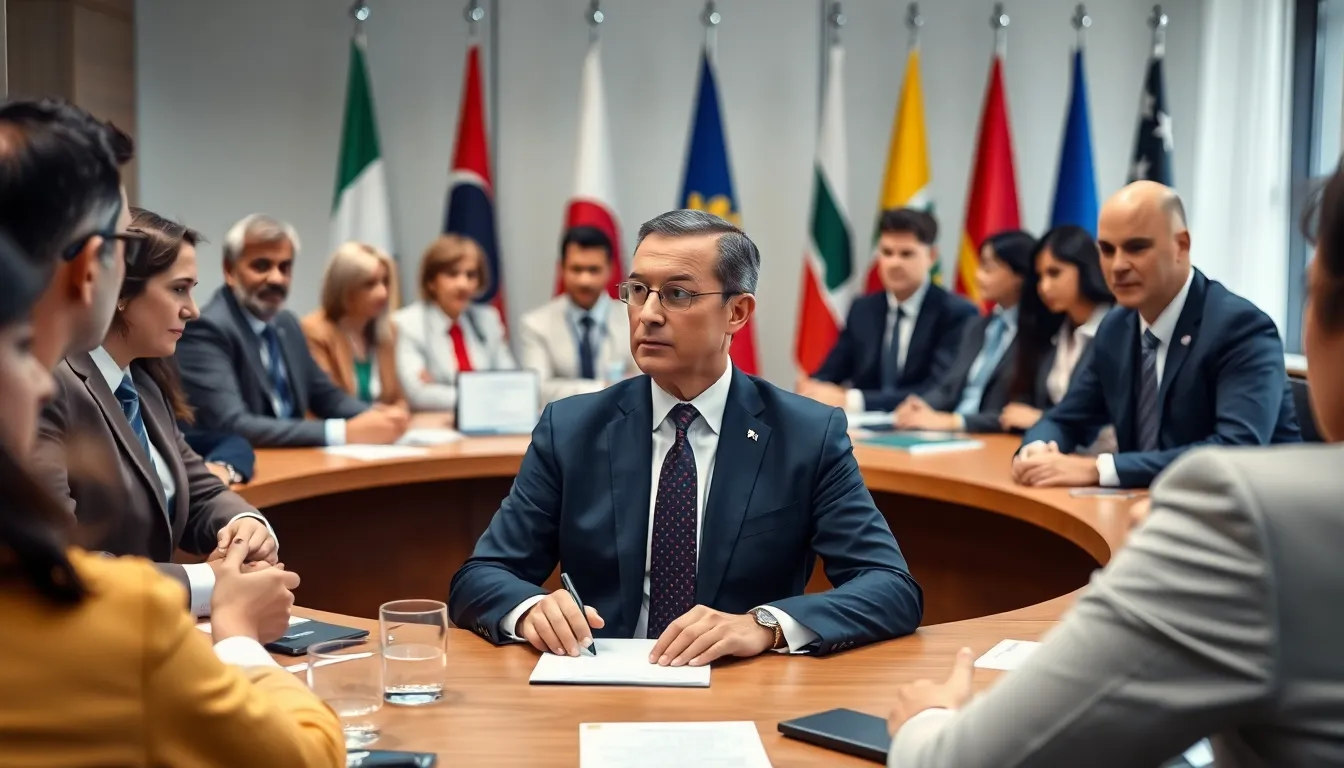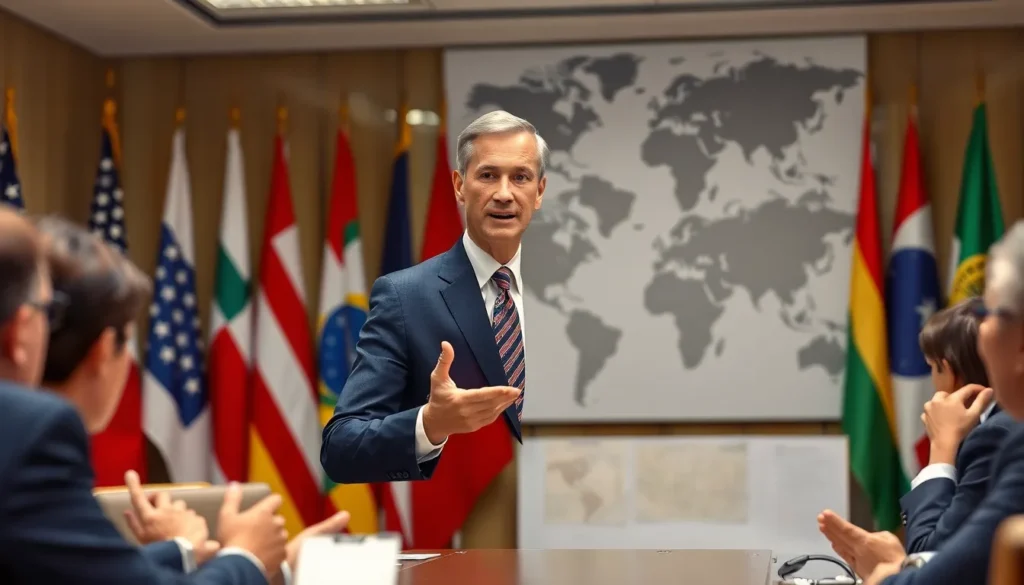Table of Contents
ToggleInternational diplomacy plays a crucial role in shaping global relations and addressing pressing issues that transcend borders. As nations navigate complex political landscapes, skilled diplomats work tirelessly to foster dialogue and cooperation, ensuring peace and stability in an increasingly interconnected world.
In this intricate dance of negotiation and compromise, understanding the nuances of international diplomacy becomes essential. From trade agreements to conflict resolution, the art of diplomacy influences everything from economic growth to humanitarian efforts. As global challenges evolve, so too does the need for effective diplomatic strategies that can adapt and respond to the ever-changing dynamics of international relations.
Overview of International Diplomacy
International diplomacy involves managing relationships between countries to promote peace, security, and cooperation. Skilled diplomats represent their nations, negotiate treaties, and facilitate discussions on issues affecting global stability. Their work extends to diverse topics, including trade agreements, conflict resolution, environmental challenges, and humanitarian efforts.
Diplomatic strategies must adapt to changing global dynamics. For instance, the rise of technology has introduced new avenues for communication, enabling more immediate responses to crises. Countries develop diplomatic protocols that embrace digital diplomacy, enhancing outreach through social media and online platforms.
Understanding cultural differences proves crucial in diplomacy. Analysis of cultural contexts helps diplomats navigate negotiations effectively. Recognizing the values and norms of other nations can prevent misunderstandings and strengthen alliances.
International organizations like the United Nations and the World Trade Organization are central to global diplomacy. These bodies facilitate dialogue among member states, offering platforms for negotiations and conflict resolution. They play a significant role in addressing global challenges such as climate change and public health crises.
Effective diplomacy also includes public diplomacy, where nations engage with foreign populations directly. Public diplomacy aims to foster mutual understanding, enhance a nation’s image, and promote shared values. Involving local communities can deepen the impact of diplomatic efforts and create lasting relationships.
Overall, international diplomacy encompasses a complex interplay of negotiation, cultural awareness, and multilateral cooperation. As global challenges become more interconnected, effective diplomatic strategies will remain essential to foster lasting peace and stability.
Key Principles of International Diplomacy

International diplomacy operates on foundational principles that guide interactions between nations and shape global relations. These principles include sovereignty, non-interference, multilateralism, and bilateralism.
Sovereignty and Non-Interference
Sovereignty ensures that states maintain authority over their territory and domestic affairs. Non-interference supports this, emphasizing respect for a nation’s right to self-determination without external pressure. For example, when negotiating peace treaties, effective diplomats respect the sovereign rights of each nation involved, preventing conflicts from escalating due to perceived violations. This principle fosters trust among states and encourages constructive dialogue.
Multilateralism and Bilateralism
Multilateralism involves multiple countries collaborating to address global issues, promoting a collective approach. Organizations like the United Nations exemplify this principle by providing forums for dialogue and cooperation on matters such as climate change and security. Bilateralism focuses on direct relations between two countries, allowing for tailored agreements that meet specific interests. For instance, trade agreements between two nations often exemplify bilateral diplomacy, fostering economic growth and partnership. Both multilateralism and bilateralism are vital in navigating the complexities of international relations.
Major International Organizations
International organizations play a pivotal role in shaping diplomatic relations and addressing global challenges. They facilitate collaboration, dialogue, and decision-making among member states.
United Nations
The United Nations (UN) stands as the foremost international organization dedicated to promoting peace, security, and cooperation among countries. Established in 1945, it comprises 193 member states. Its functions include peacekeeping missions, conflict resolution, and humanitarian efforts. The UN’s diverse agencies, like the World Health Organization (WHO) and the United Nations Educational, Scientific and Cultural Organization (UNESCO), focus on specific global issues, enhancing collective responses to challenges such as public health crises and sustainable development.
European Union
The European Union (EU) is a political and economic union of 27 European countries aiming to foster integration and cooperation. Since its inception in 1993, the EU promotes the free movement of goods, services, people, and capital within its member states. The EU addresses regional stability, economic growth, and environmental sustainability through policies and initiatives that include the Common Foreign and Security Policy (CFSP), which enhances diplomatic relations and addresses security challenges in the region.
Global Challenges in International Diplomacy
International diplomacy faces several pressing global challenges that require coordinated efforts from nations. Addressing these challenges is vital for fostering sustainable development and promoting international peace.
Climate Change
Climate change poses significant challenges that threaten global stability. Its effects include rising sea levels, extreme weather events, and resource scarcity. Diplomatic efforts focus on international agreements like the Paris Agreement, which unites countries in commitments to reduce greenhouse gas emissions. Negotiations often center on financial assistance for developing nations, technology transfer, and accountability measures. Countries face pressure to demonstrate their adherence to climate goals, making cooperation essential for achieving long-term solutions.
Human Rights
Human rights issues remain at the forefront of international diplomacy. Countries often confront allegations of abuses, ranging from discrimination to authoritarian governance. Diplomatic channels aim to promote universal human rights standards, but nations may resist external interference in their domestic affairs. Supranational organizations, such as the United Nations Human Rights Council, play critical roles in monitoring and addressing these violations. Diplomatic engagement can lead to sanctions, dialogues, or collaborations that foster improvements in human rights practices, though the effectiveness of these strategies varies.
International diplomacy remains a cornerstone of global relations in today’s interconnected world. It requires skilled diplomats who navigate complex issues and foster cooperation among nations. The emphasis on cultural awareness and adaptability highlights the evolving nature of diplomacy in response to technological advancements and shifting global dynamics.
As countries face pressing challenges like climate change and human rights violations, the importance of multilateral efforts cannot be overstated. Organizations such as the United Nations play a pivotal role in facilitating dialogue and promoting peace. Ultimately, the intricate web of international diplomacy is vital for ensuring stability and collaboration across borders, paving the way for a more harmonious global community.







